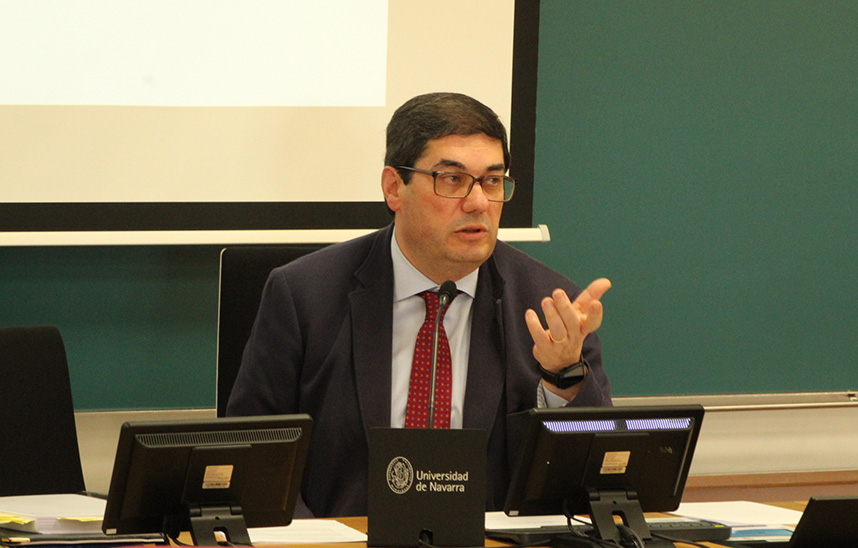Are ethics and logic parallel disciplines? Professor Mariano Crespo teaches a seminar of department de Philosophy

03 | 02 | 2023
When Aristotle proposed in his Metaphysics what would later be known as the principle of non-contradiction, he established a solid logical principle. Like this, the philosophical tradition has known many principles that, however, do not seem as strong as this one, such as Kant's categorical imperative or Bentham's principle of utility. What does this mean?
On January 21, Mariano Crespo, Full Professor of Philosophy and director academic of Master's Degree in Christianity and Contemporary Culture of the School of Philosophy and Letters of the University, addressed this question in a seminar of department of Philosophy. Starting from the question "Are ethics and logic parallel disciplines?", Professor Crespo exposed the thought of Edmund Husserl who, in his opinion, can help to solve this question.
"By drawing a parallel between the principles of non-contradiction and utility it can be seen that the correctness of logical laws does not seem to be shared by ethical laws," the professor pointed out. Husserl notices this and, in turn, wonders about the possibility of logic "infecting" its correctness to ethics, as he explained. From agreement to the German philosopher's definition, logic is a technology of thinking that judges according to truth. "If this is so, wouldn't it be possible for ethics to be a sort of science rules and regulations of human ends? Is a merely formal ethics possible just as there is a merely formal logic?", Crespo questioned the audience.
As he pointed out in his speech, the possibility of a formal ethics is not a new problem: "Husserl recognizes Aristotle as the father of logic, since he inaugurates this discipline as a precept of the scientific knowledge . However, he does not consider him the father of ethics: he failed to seek a parallelism between logic and ethics". As Husserl explains, it is in modernity that this parallelism begins to be sought in an effort to establish an a priori ethics, to delimit a system of absolute and pure principles of reason internship. "Thus, such principles could indicate for all human action normative criteria in an absolute sense. It is here that the parallelism with logic is glimpsed; an example of this is the one that can be given between the aforementioned principle of non-contradiction from an ethical perspective: If A is a positive value, then it is not a negative value. If it is a negative value, then it is not a positive value," explained Prof. Crespo. "However, this does not imply interchangeability, since there are specifically ethical phenomena that have no parallel in logic," he added.
The parallelism of ethics with logic is an approximation subject from which Husserl will later distance himself, since it is not sufficient to account for the specificity of the ethical sphere. Although he rescues from it the propaedeutic character, because it establishes the parallelism between the fundamental types of the act, as it exists between the theoretical, volitional or estimative ones. As the professor affirmed, "the interesting thing about Husserl's proposal is the finding of the emotive acts - to rejoice, to be saddened, to fear, to decide, etc. - which are traditionally considered to belong to the sphere of the chaotic, but this subject of research tries to show that they are not as chaotic as they appear to be. Thus, it opens a study of the emotional sphere and a vindication of this sphere as a place where order exists".
